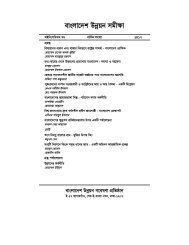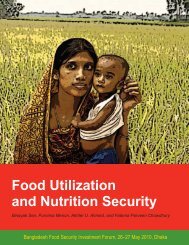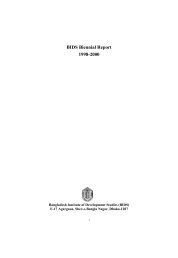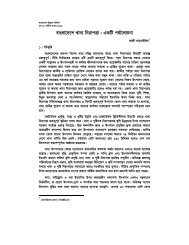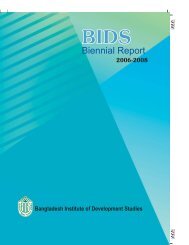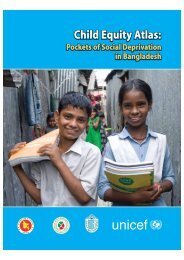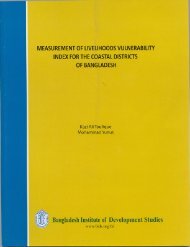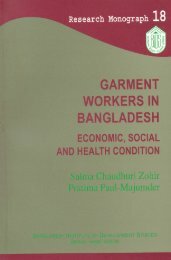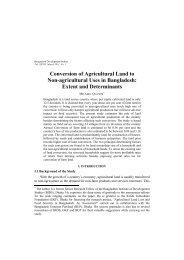2009-2010 - BIDS
2009-2010 - BIDS
2009-2010 - BIDS
You also want an ePaper? Increase the reach of your titles
YUMPU automatically turns print PDFs into web optimized ePapers that Google loves.
Population, Health and Gender<br />
Issues<br />
Assessing the Knowledge, Attitude and Practice<br />
of Religious Leaders towards Reproductive<br />
Health and Gender Related Issues<br />
The study examines the change in knowledge,<br />
attitude and practices of trained religious leaders<br />
relative to those not reached by the UNFPA<br />
supported intervention programs on reproductive<br />
health and gender related issues including violence<br />
against women. The study brings out that training<br />
of religious leaders improves the knowledge and<br />
awareness towards major aspects of reproductive<br />
health and gender issues. The findings suggest that<br />
the level of knowledge of religious leaders regarding<br />
‘safe motherhood’, ‘complications during pregnancy’<br />
and understanding of ‘reproductive health’ changes<br />
significantly because of training. Trained religious<br />
leaders are found to deliver important messages<br />
and disseminate information on the benefits of small<br />
family, family planning, need for anti-natal and postnatal<br />
care, and other aspects of reproductive health<br />
including STD, HIV/AIDS. The study was completed in<br />
April <strong>2009</strong> and its Project Director was M.A. Mannan<br />
with Mohammad Sohail as the co-researcher.<br />
The Stakeholders’ Consultation Report: The Mid<br />
Term Review of the Bangladesh Health, Nutrition<br />
and Population Sector Program<br />
The consultation was organized to elicit views<br />
of different stakeholders on family planning and<br />
maternal health care services at the local level<br />
and understand the major obstacles of women,<br />
particularly rural women, in using these services.<br />
The report was based on focus group discussions,<br />
in-depth interviews, case studies and consultation<br />
workshop with different stakeholders both at local<br />
and national levels. The findings suggest that the<br />
first important task with regard to maternal services<br />
in the national level is to create awareness in the<br />
community about importance of maternal health<br />
care services and make people understand that the<br />
act of childbearing viz. pregnancy and childbirth<br />
require special attention and care. The project was<br />
completed in August 2008 and Sharifa Begum was its<br />
Project Director with Zulfiqar Ali as the co-researcher.<br />
An Inventory and Statistics on Violence against<br />
Women in Bangladesh: Who is Doing What and<br />
Where<br />
The study provides an inventory of statistics<br />
on violence against women in Bangladesh<br />
and identifies existing services to address the<br />
needs of the victims of violence and suggests<br />
indicators for monitoring. The findings show that<br />
violence against women is rising especially due<br />
to unchanged deep rooted values, beliefs and<br />
attitudes towards women, social tolerance of<br />
domestic violence, and lack of gender sensitivity in<br />
dealing with cases of violence. Various actions are<br />
suggested for reducing violence against women<br />
such as organizing resistance movement, creating<br />
awareness, providing legal services and working<br />
for legal reforms. The study was completed in May<br />
<strong>2009</strong> and its Project Director was M.A. Mannan<br />
with Salma Chaudhuri Zohir as the co-researcher.<br />
Discriminatory Provisions Towards Women and<br />
Girls<br />
In order to promote women’s human rights and<br />
protect all their interests, the UN CEDAW is an<br />
international human rights treaty devoted to the<br />
rights of women. The study assesses the CEDAW<br />
implementation in Bangladesh based mostly on<br />
secondary information and recommends that<br />
measures have to be taken to create awareness<br />
among people, particularly among policymakers,<br />
planners and program/project implementers<br />
about CEDAW, NPWA, and NAP to make them<br />
gender sensitive and enable them to appreciate<br />
the role and importance of women. The study was<br />
16<br />
<strong>BIDS</strong> Biennial Report <strong>2009</strong>-<strong>2010</strong>



